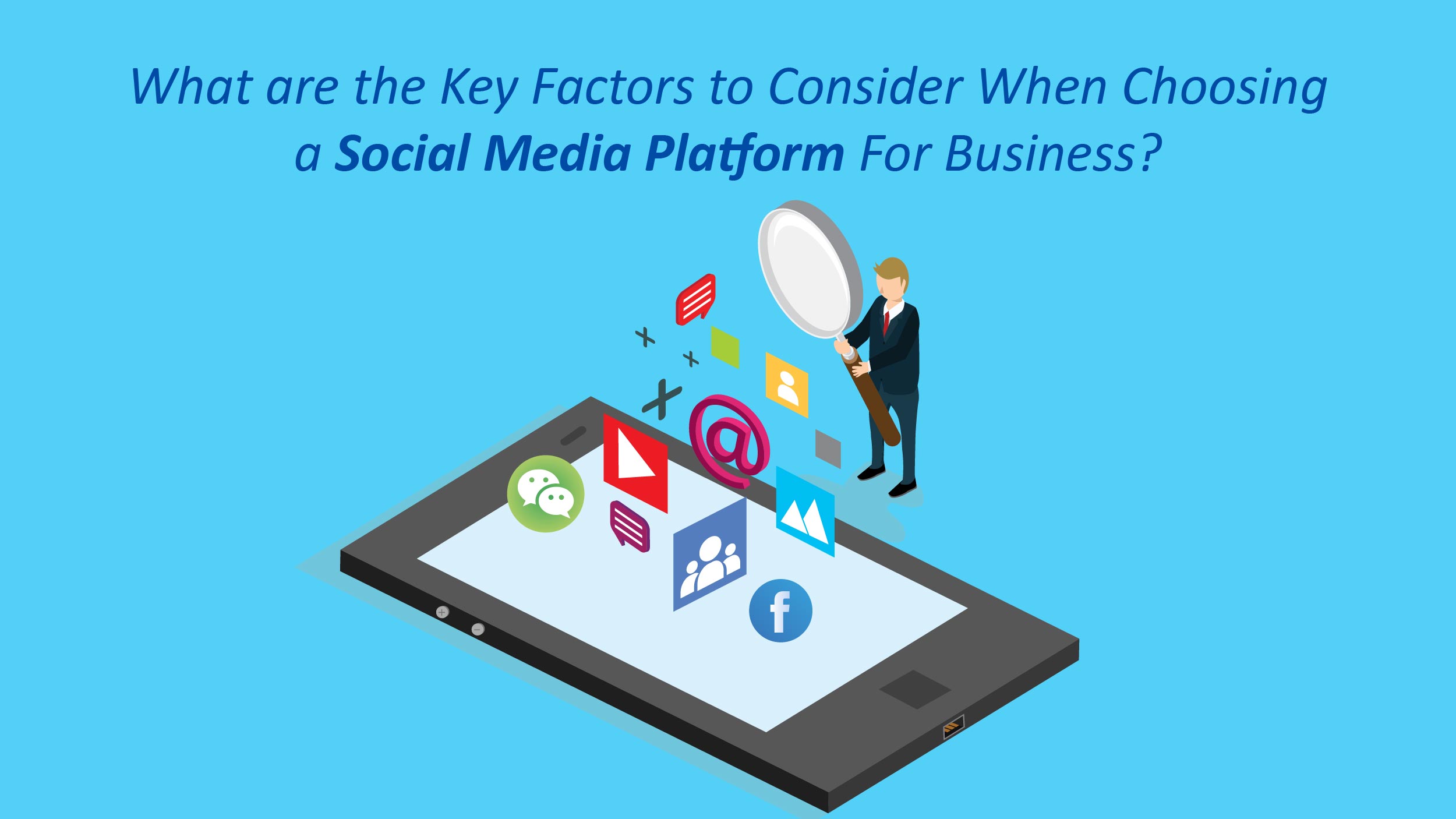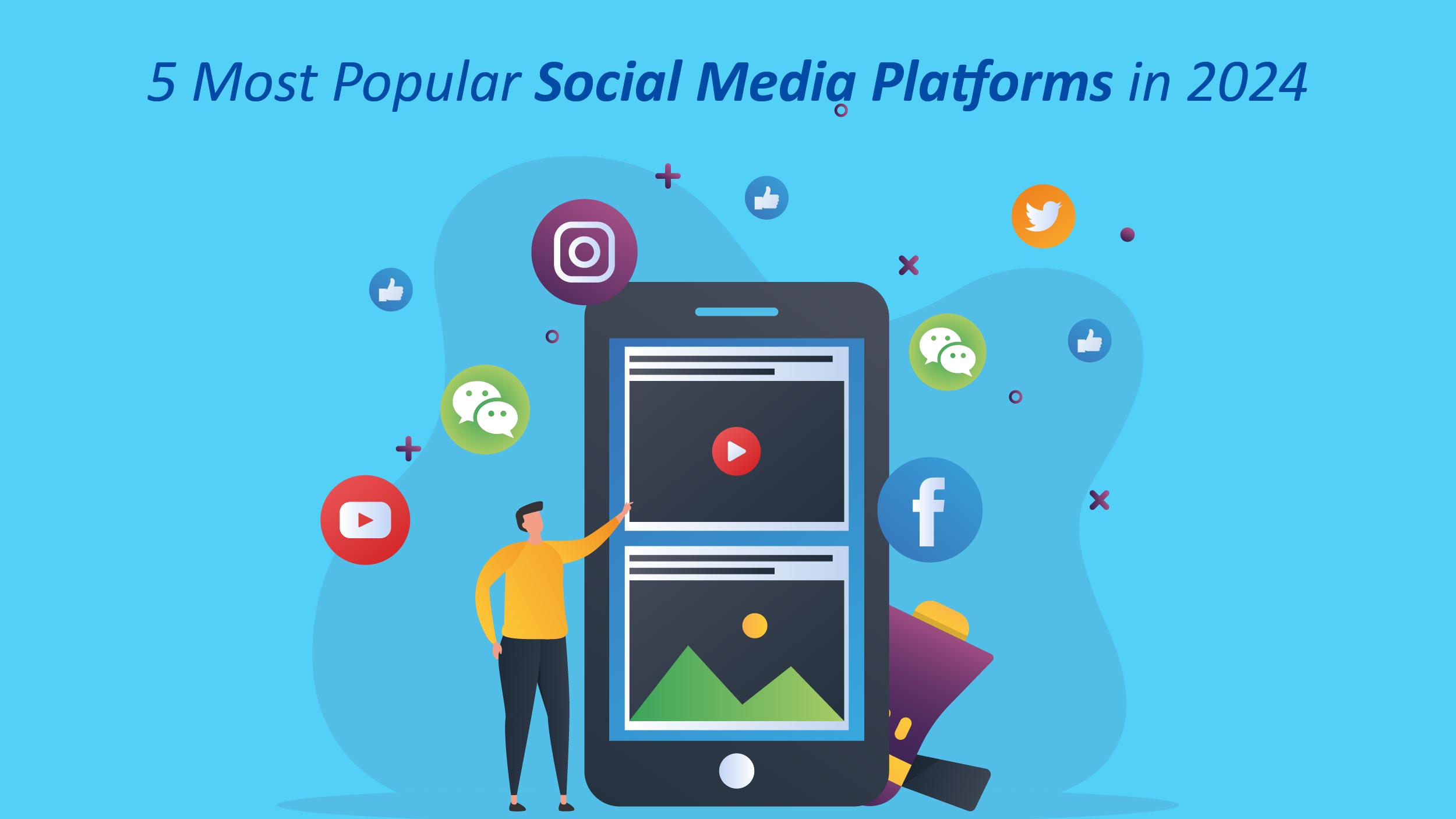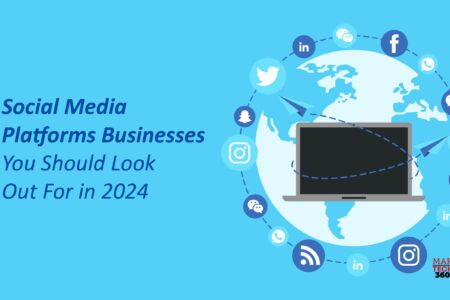Everyone must have used social media platforms at least once in their life. From Facebook to TikTok, the craze for being at the forefront of social media is astonishing.
As of January 2024, about 62.3% of the world’s population uses social media, and that’s 5.04 billion people. This is why social media platforms for business are a must. This article discusses why your business needs to be on social media and the top five platforms you can benefit from.
What are the Key Factors to Consider When Choosing a Social Media Platform For Business?

- Target audience: Select a platform where your audience is active and engaged.
- Type of content: Different platforms have different strengths, so choose one that aligns with the type of content you plan to create and distribute.
- Goals and objectives: Assess your business goals to determine which platform will best help you achieve them. Consider if customer support or brand awareness are priorities.
- Available resources: Consider the time, budget, and manpower you have available to dedicate to social media management.
- Competitor analysis: Look at what platforms your competitors are using and how successful they are on those platforms.
- Platform features: Evaluate the features and tools offered by each platform and determine if they align with your business needs.
- User demographics: Research the demographics of each platform’s user base to ensure it matches your target audience.
- Engagement and reach: Evaluate the platform’s algorithms, organic reach, and advertising to ensure your social media content will be seen by a wide audience.
5 Most Popular Social Media Platforms in 2024

Facebook: 2.95 MAU
Facebook still is the most popular social media platform in 2024, with approximately 3 billion active users using it monthly. It is the largest social media platform, with over 37% of the world’s population being prime users.
Facebook is a reasonably safe option if you want to have a social media presence because more than 200 million businesses—mostly small businesses—use its tools, and more than seven million marketers actively promote their businesses on the site.
Facebook is simple to use, as almost all content forms, including text, images, video content, and stories, function well there. However, the Facebook algorithm gives priority to content that promotes meaningful interactions and discussions among people, particularly those from friends and family.
How many times have you come across an advertisement or a promotion of products or services on Facebook? Countless, right? If you still aren’t convinced, have a look at how the big brand used Facebook’s social media platform.
- For instance, Coca-Cola utilized Facebook to launch a campaign called “Share a Coke” that allowed users to customize their own Coke cans with their names. This ad helped Coca-Cola draw in a younger audience by generating a buzz on social media.
- Another example is Nike, which used Facebook to draw viewers by showcasing its products and endorsing athletes. With over 31 million likes on its Facebook page, Nike was able to attract a sizable fan base and expand product demand.
Also Read: What is Media Buying and Why is it Important?
Instagram: 2 billion MAU
Who isn’t hooked on this viral social media baby? With its short-reel options for sharing long, visually appealing posts, Instagram has quickly become everyone’s favorite, harboring over 2 billion active users.
Instagram is a great platform for promoting your products and services because it’s a visual social networking site. You can share a variety of media on the app, including images, videos, stories, reels, live videos, and longer-form movies on IGTV.
You can set up an Instagram business profile as a brand, which offers detailed analytics for your profile and posts and the capacity to plan Instagram updates using third-party applications. Users regularly post content and tag companies, making it an excellent location to gather user-generated content from your audience.
Let’s have a look at how brands utilize this social media platform and how you can do it too.
- One such example is the well-known skincare and cosmetics company, Glossier. Glossier used Instagram to build a devoted following, with whom they routinely engage by reposting user-generated material, soliciting comments and suggestions, and sharing behind-the-scenes photos of their operations. Also, they have promoted new collaborations and products on Instagram using captivating and imaginative images and remarks that caught the audience’s attention like wildfire.
- Another company utilizing Instagram to its best extent is Taco Bell. They have a fun, witty brand language that works well on Instagram, where they routinely post funny, relatable material that connects with their followers. Also, they utilize Instagram to announce new partnerships and goods, frequently teasing them with cryptic or amusing pictures that stir up interest.
WhatsApp: 2 billion MAU
Following Facebook and YouTube, WhatsApp ranks third among the most popular social media platforms in 2023, with over 2 billion active users. The growth of WhatsApp is attributable to consumers viewing the platform as an arena to connect with family and friends and also to facilitate official communications.
People use WhatsApp, a messaging service, in more than 180 different countries. Initially, WhatsApp was primarily used by users to text their relatives and friends. People gradually began contacting companies using WhatsApp.
Businesses may offer customer service and update clients on their purchases using WhatsApp’s business platform. While big firms can use the WhatsApp Business API, smaller companies can use the WhatsApp Business app.
Given below are examples of how big brands grabbed consumers’ attention using WhatsApp’s social media platform.
- Hellmann’s: The mayonnaise company developed a WhatsApp bot that would offer recipes depending on the customer’s available ingredients. Even a shopping list and suggestions for missing ingredients would be provided by the bot to make the recipe.
WeChat: 1.3 billion MAU
Tencent, one of the largest technology companies in China, introduced WeChat in 2011. WeChat was initially started as a messaging platform with a similar application to WhatsApp and Messenger, but has since transformed into a multipurpose platform. In addition to messaging and phoning, users may shop online, make bookings, pay bills, buy groceries, send money, and more.
In China and other Asian countries, WeChat is the most widely used social media platform. WeChat is a wonderful alternative if you want to promote your company in China. You can run advertisements on WeChat Moments or the official WeChat account. Your brand may reach millions of Chinese consumers with the support of numerous influencers active on WeChat.
For instance, Mercedes-Benz introduced its new GLA vehicle on WeChat and offered test drives to users of the app. In a campaign run by Lancôme, customers could scan QR codes to get tailored skincare advice.
YouTube: 2.5 billion MAU
According to a recent report released by Statista, YouTube ranks as the second most popular social media platform in 2023, with over 2.5 billion active users.
YouTube is an actively used video-sharing social media platform where viewers can watch billions of videos every day. YouTube is frequently referred to as the second-largest search engine behind its parent firm, Google, in addition to being the second-largest social media platform.
So, you must include YouTube in your marketing plan if you use videos to advertise your brand.
Let’s have a look at the case study where brands have utilized YouTube in their marketing strategy.
- Nike has utilized YouTube to make uplifting and motivating videos that promote its brand values and dedication to athleticism and fitness. A video advertisement for Nike’s “Dream Crazy” campaign, for instance, presents the motivational tale of athletes who overcome hardship to succeed.
- Red Bull has harnessed YouTube to produce electrifying videos that highlight extreme sports and activities that are high in adrenaline. One such is their “Red Bull Stratos” advertising campaign, in which skydiver Felix Baumgartner leaped into space while wearing an outfit bearing the Red Bull insignia.
Final Takeaway
Choosing the optimal social media platforms for your business constitutes a strategic choice contingent upon your precise objectives and desired audience engagement. Given that each social media platform serves a particular demographic and presents distinct functionalities, it’s crucial to align your platform selection with your business goals. We advise leveraging multiple platforms to amplify your online presence, acknowledging that individuals may gravitate towards specific platforms. Embracing a diversified social media strategy not only broadens your reach but also enhances the likelihood of connecting with potential customers.

